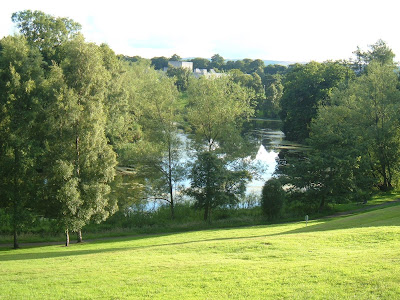posted by kathyI've just realised that Summer Gathering is a sort of Quaker Butlin's. Not the new Butlin's, where people do their own thing, but the old-style Butlin's, complete with organised activities, plenty for children and a full-time entertainments team. Summer Gathering has its own redcoats, though there are differences. For a start, they don't wear red coats but blue scarves - unless they're working with the children, in which case the scarves are orange. Quite often the Summer Gathering entertainments team will suggest a period of silence. So far as I know, Butlin's never provided that. Butlin's redcoats are employees. Ours, known as the "core team", are hard-working volunteers.There aren't quite wall-to-wall entertainments and activities but sometimes it feels like that, especially when there's a hilly campus to cross.  The marquee hosts events which range from Meeting for Worship to the end of Gathering ceilidh. There's community singing, talks and an evening when Quaker groups can lay out their wares and talk about their activities.
The marquee hosts events which range from Meeting for Worship to the end of Gathering ceilidh. There's community singing, talks and an evening when Quaker groups can lay out their wares and talk about their activities.
We also have small base groups, although I've mostly given mine a miss. I got into the swing of Summer Gathering too late. Events meant that I had to bring some work with me and that ate into my time. I didn't get much chance for informal chats either, which was a shame. Still, the talks I've attended have been good, even if I found myself too tired for the final Meeting for Worship. (Well, I expect there'll be an epilogue after the ceilidh.)
I did get to the Leaveners' production of George and the Chocolate Factory, after a Friend in my flat got a ticket for me. And I decided I ought to go to some of the activity sessions. After playing safe by choosing poetry, I decided to "live adventurously" by trying art and handbell ringing. These may not be activities I'll try again, but I found them absorbing and am glad to have had a go.

There's a Quaker bookstall and a fair trade stall in one of the university buildings. I spent a lot of time wandering round but didn't buy anything. I would have done, but fairtrade orange juice ran out on day 2. And there are all kinds of events in seminar rooms and lecture theatres. For the duration of Gathering, rooms were renames after fruits or vegetables, according to which building they were in. This caused a great deal of confusion. "But tomatoes aren't vegetables - they're fruit," people complained until the daily bulletin issued a firm announcement that, for the duration of the Gathering, tomatoes were defined as veg. Meanwhile a group of dissidents stood round grumbling that bananas weren't fruit or vegetables but, properly speaking, herbs. Fortunately the "bananas are herbs" lobby didn't go quite so far as to demand a new building.
As it all comes to an end, I realise I've missed most of it. I wish I'd gone to Faslane (Butlin's holiday camps don't offer jolly holiday protests) or to see New Lanark on the excursions day, but I didn't book, thinking there might be a chance when I got here. In the end I was just too tired.
Most people look tired by now, though children are bounding with energy. Teenagers struggle to stay awake from breakfast till after midnight, making the most of time with one another. Friendship bracelets are everywhere and much music is made. Activity holidays are hard work. I didn't have much energy when I arrived. Still, the campus is lovely, I've met some old friends (too briefly) and heard words that will stay with me for a long time. Nor shall I forget the kindness of the university staff, which went far beyond their terms of employment. I think that is enough.






